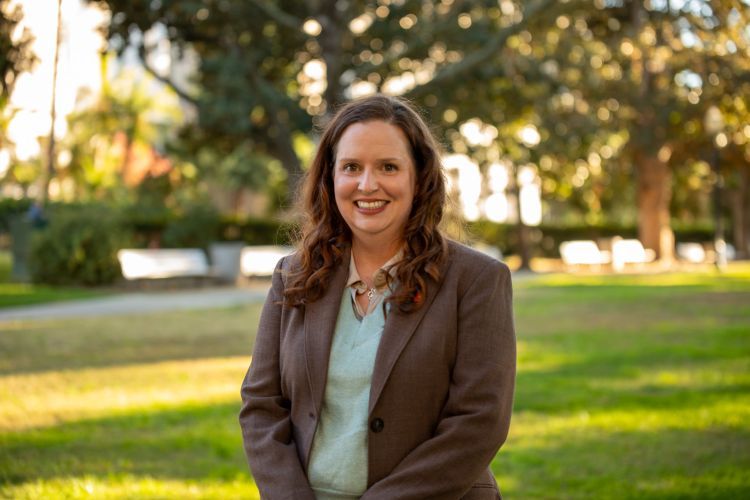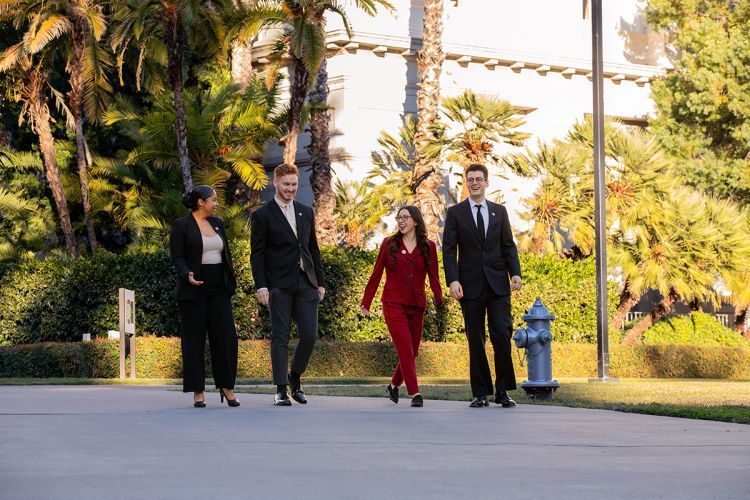Breadcrumb
Immigration Law Clinic provides invaluable services to Afghan refugees

Michael Dastas, '22, and Alyssa Eckels, ’22, provide services to refugees through their work in the Immigration Law Clinic. Photo by Alex Banks.
“True heroes work in that clinic”
After the fall of Afghanistan in August 2021, a surge of humanitarian parole applications were filed for people desperate to come to the United States. Only a small percentage have been approved.
One of the few successful cases was prepared by Alyssa Eckels, ’22, a student attorney in McGeorge School of Law’s Immigration Law Clinic during the 2021-2022 academic year. The Clinic is one of seven at McGeorge in which students gain real-world experience working on actual cases.
With her client still in Afghanistan, Eckels worked closely with his American fiancé.
“There was very much a big fear aspect,” said Eckels, whose client was in hiding from the Taliban. “He would send emails when he could with photos and identification cards to show his connections with the United States and why he might be a target.”
The case — which was approved over the summer — was, “a reminder of why I went to law school,” said Eckels, who returned to the Clinic in the fall as a graduate fellow.
Seven other students worked alongside Eckels in the Clinic, including Sofia Schersei, ’22, who has family in Afghanistan.
“A lot of people were coming not knowing what to do or where to go,” she said. After seeing the immense need for legal services, Schersei started putting in nearly 40 hours a week at the Clinic while also going to law school. Many other students devoted extra hours as well.
“People underestimate how much goes on in the Clinic,” Schersei said. “True heroes live and work in that Clinic.”
Since her primary client was already in the U.S., Schersei helped with legal issues such as obtaining a work permit — a critical step to getting him resettled.
“Because he had a diplomacy visa, he couldn’t work in the U.S. and he was not getting the benefits of the $1,200 other refugees were getting for housing. He was homeless,” she said. Schersei had the issue resolved in a few weeks. She then moved on to the lengthy process of filing for asylum.
“These students are great ambassadors for our community in terms of showing empathy and respect for these recent arrivals in our community,” said Blake Nordahl, supervising attorney for the Immigration Law Clinic.
Professor Emerita Julie Davies, a part-time staff attorney in the Clinic, is also doggedly working through asylum cases.
“Afghans who were legally admitted to the U.S. in 2021 have a status called paroled. If they hope to have permanent status, it’s best for them to file for asylum within one year, so we turned our attention to that,” Davies said. “We had to get translators, write declarations and get evidence. It is a huge amount of work to do a good job.”
As they worked through legal hurdles, students also found more immediate ways to show support. Schersei and Eckels were instrumental in collecting donations for refugees and raising money to cover expensive filing fees.
“We wanted to do something else, something more tangible to help our clients,” Eckels said.
The work continued with a new group of students this fall. In addition to helping clients in the Clinic, students assisted refugee resettlement agencies in Sacramento at weekend workshops to accommodate the crucial need for legal assistance.
“These students are great ambassadors for our community in terms of showing empathy and respect for these recent arrivals in our community,” said Blake Nordahl, clinical professor of law and supervising attorney for the Immigration Law Clinic.
“I think it means a lot to somebody who is new to this country to see there are people who care for them and are advocating for their rights,” he said. “That's what our students are doing and will continue to do. And they do an excellent job of it.”
For more information about McGeorge School of Law, visit our website.
Media Contacts:
- Ashley Golledge, Director of Marketing and Communications, agolledge@pacific.edu, 916.325.4687
- Victoria Ambriz, Marketing Coordinator, vambriz@pacific.edu, 916.325.4631
- Alex Banks, Communications Coordinator, abanks@pacific.edu, 916.520.7479





